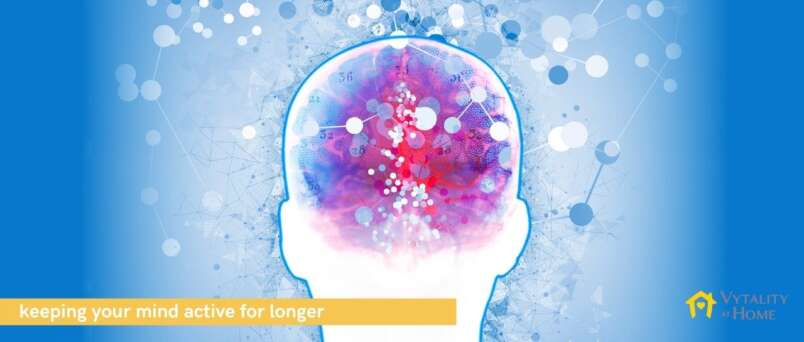Remember this: new study into cognitive resilience reveals how to keep your mind active for longer
As more and more of us live into our 90s, a new study sheds light on how we can all help preserve our thinking and memory skills for longer. (3)
Beth E. Snitz, PhD, associate professor of neurology at the University of Pittsburgh School of Medicine, followed 100 people for 14 years as they approached the age of 90. As Snitz says:
“With more and more people living into their 90s and even 100s, it’s increasingly important that we be able to understand and predict the factors that help people preserve their thinking skills as they age.”
Brain scans and memory tests
All the group under took memory and thinking tests, plus a brain scan to detect any amyloid-beta plaques, protein formations linked with Alzheimer’s disease. None of the group had signs of Alzheimer’s when the study started.
Alzheimer’s and amyloid plaques
Most people develop amyloid plaques as they grow older. Snitz and her team discovered that 66% of the the research group developed amyloid plaques, but not all of those with plaques showed symptoms of Alzheimer’s or dementia. What’s more, people with a specific type of gene were six times less likely to have amyloid plaque buildup even as they aged.
The crucial gene is APOE, or apolipoprotein E, which has been linked with late-onset Alzheimer’s. It comes in three forms.
- Those with the least common form APOE e2 had low amyloid plaque buildup,with a reduced risk of Alzheimer’s.
- Those with the second most common form, APOE e4, are more at risk from Alzheimer’s. (2)
In the study group, only 10% (10 people)had the gene variant APOE e2. Of these 10, 7 avoided plaques, with the remaining 3 developing plaques. (4)
Key factors for maintaining a good memory
Her study pinpointed those who retained a good memory despite plaque buildup. Common lifestyle factors amongst this group included those who:
- Had good thinking skills
- Were satisfied with life
- Were in paid employment when the study started
Common health indicators for longer memory retention included:
- Good cardiovascular health
“Growing evidence supports a strong and likely causal association between cardiovascular disease (CVD), and its risk factors, with incidence of cognitive decline and Alzheimer’s disease. Individuals with subclinical CVD are at higher risk for dementia and Alzheimer’s.” (5)
- Never having smoked
Those who had never smoked were to times more likely to maintain their mental skills even if they did have plaques, compared with those who were smokers.
- A healthy pulse pressure
Those with a high pulse pressure were more likely to have an increase in plaque buildup over time. Pulse pressure is an indication of the health of your cardiovascular system. Your pulse pressure is simply the “top” measurement of your blood pressure (the systolic pressure) minus the “bottom” figure (the diastolic pressure). Subtract the bottom number from the top and you’ll have your pulse pressure in mm Hg. A healthy range is between 40 and 60 mm Hg, and your pulse pressure will tend to rise as you pass the age of 50 as your arteries stiffen. (1)
Use it or lose it
People on the study who acheived a normal score on the thinking and memory tests were less likely to develop memory problems later, even with plaques in their brains. As Snitz said:
“The theory (is) that people with better lifelong thinking and memory skills have a ‘cognitive reserve’ that provides a buffer of protection against changes in the brain.”
Note the word lifelong. Seniors need to keep their brains and memory active as well as their bodies, to build that ‘cognitive reserve’.
How Vytality at Home can help
Our home care service isn’t just about doing the necessaries. We ensure there is plenty of time for that all-important cognitive stimulation, from a crossword or a game of chess, to talking through memories stimulated by a photo album. We can offer this as our caregiver visits are a minimum of two hours, giving ample opportunity for a mix of personal care, light housekeeping, and engagement. Engagement services includes a Cognitive Stimulation program tailor-made for each client, which includes stimulating brain games and specific memory activities.
For more details, see our Engagement services page or call us to discuss home care services in Calgary for a loved one, an ageing parent, or for yourself. We’re here to help, so call us today at 403 476 3680.
NOTES
(1) https://www.healthline.com/health/pulse-pressure#research
(2) www.mayoclinic.org/alzheimers-genes/art-20046552
(3) “Predicting resistance to amyloid-beta deposition and cognitive resilience in the oldest-old”
Beth E. Snitz, Yuefang Chang, Dana L. Tudorascu, Oscar L. Lopez, Brian J. Lopresti, Steven T. DeKosky, Michelle C. Carlson, Ann D. Cohen, M. Ilyas Kamboh, Howard J. Aizenstein, William E. Klunk, Lewis H. Kuller
Neurology Aug 2020, 95 (8) e984-e994; DOI: 10.1212/WNL.0000000000010239
https://n.neurology.org/content/95/8/e984
(4) https://www.eurekalert.org/pubreleases/2020-07/aaon-wfh072020.php
(5) https://pubmed.ncbi.nlm.nih.gov/16918818/ Stampfer MJ. Cardiovascular disease and Alzheimer’s disease: common links. J Intern Med. 2006;260(3):211-223. doi:10.1111/j.1365-2796.2006.01687.x




